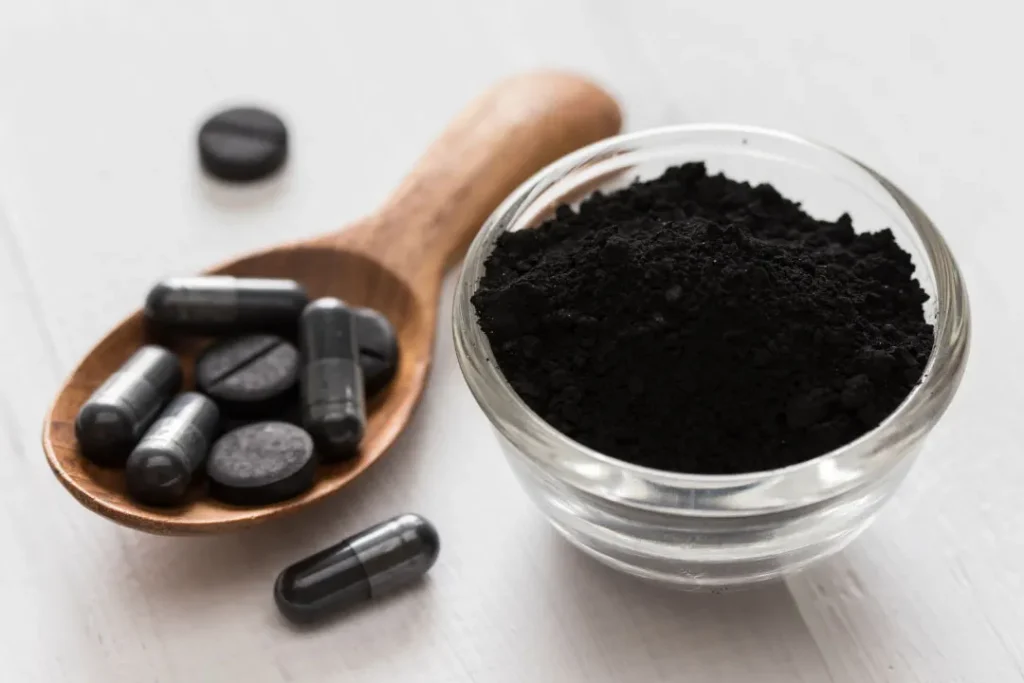Activated charcoal is a type of charcoal that has been oxygen-treated to produce a highly porous substance. As a result, it is widely used in a variety of goods, including water filtration systems, air purifiers, and, most importantly, nutritional supplements. Because of its possible health benefits, the usage of activated charcoal as a supplement has grown in popularity in recent years. We will look at the nature of activated charcoal, its potential health advantages, ideal dosage, adverse effects, potential substance interactions, and responsible applications in this article.
You May Also Like:
BrainMD Reviews vs myPEAK Brilliance Reviews
Natural Stacks’ Serotonin Brain Food vs. DELTA BrainLuxury
Nature of Activated Charcoal:
Activated charcoal is manufactured from a variety of carbon-containing materials, including coconut shells, wood, and peat. In the absence of air, these materials are heated to high temperatures, resulting in the elimination of any volatile chemicals and the formation of a carbon-rich residue. This residue is then oxygenated to produce activated charcoal. The oxygen treatment forms millions of tiny pores on the surface of the charcoal, increasing its surface area and making it highly porous.
Health Benefits of Activated Charcoal:
The following are some of the potential health benefits of activated charcoal:
- Activated charcoal can improve digestive health by adhering to toxins and chemicals in the GI tract and blocking their absorption into the bloodstream. This can help with gas, bloating, and indigestion.
- Kidney Health: Activated charcoal can enhance kidney function by lowering blood levels of pollutants and chemicals that can harm the kidneys. It is frequently used to treat acute renal damage.
- Skin Health: By eliminating impurities and toxins from the skin, activated charcoal can help improve skin health and reduce the risk of acne and other skin disorders.
- Activated charcoal can improve oral health by eliminating stains and bacteria from the teeth and gums, lowering the risk of tooth decay and gum disease.
- Poisoning: Activated charcoal is frequently used in emergencies to treat poisoning, because it may bind to and remove poisons from the bloodstream.

Chemistry of Activated Charcoal:
As stated, activated charcoal is a type of carbon that has been oxygenated to produce a highly porous substance. The oxygen treatment forms millions of tiny pores on the surface of the charcoal, which increases its surface area and causes it to be highly porous. Because of its porous nature, activated charcoal can adsorb a wide spectrum of substances, poisons, and pollutants.
The presence of surface functional groups on activated carbon such as carboxyl, hydroxyl, and amine groups, can form hydrogen bonds with target molecules. This contributes to the adsorption mechanism of activated charcoal. Furthermore, the surface area and pore size distribution of activated charcoal influence its adsorption ability.
Several parameters, including pH, temperature, and the chemical composition of the target molecule, can influence activated charcoal’s adsorption capacity. Because of the presence of carboxyl groups on its surface, activated charcoal has a higher adsorption capability for acidic molecules than for basic compounds.

Activated charcoal is also an effective gas adsorbent, particularly for carbon dioxide and methane. The physical adsorption mechanism, which is based on the Van der Waals forces between the gas molecules and the surface of the activated charcoal, is primarily responsible for gas adsorption.
Physiological Mechanism of Action of Activated Charcoal:
When activated charcoal is consumed, it binds to these chemicals in the gastrointestinal system, preventing them from being absorbed into the bloodstream. This lowers the overall toxic load in the body, which can help improve a variety of health outcomes, including kidney function and digestive health.
Optimal Dosage of Activated Charcoal:
The best amount of activated charcoal to take depends on the user and the intended use. However, 1-2 grams of activated charcoal per day are advised for general detoxifying purposes. The dosage may be increased for particular medical problems, such as acute renal injury, and should only be taken as prescribed by a doctor.
It is significant to remember that activated charcoal can bind to toxins, drugs, and other nutrients and eliminate them from the body. Hence, to prevent interference, it is advised to consume activated charcoal at least 2 hours before or after taking any vitamins or drugs.
Side Effects of Activated Charcoal:
When used according to instructions, activated charcoal is usually regarded as safe. But it might also cause certain negative effects, such as the following:
- Constipation: Water in the digestive tract can bond to activated charcoal, causing constipation.
- Stomach Issues: When taking activated charcoal, some people may experience nausea, vomiting, or diarrhea.
- Black Stools: Stools that have been turned black by activated charcoal may be misinterpreted for gastrointestinal hemorrhage.
- Medication interference: Activated charcoal can bind to pharmaceuticals, lowering their potency. As a result, it’s crucial to consume activated charcoal at least two hours before or after ingesting any drugs to avoid any interference with the absorption of drugs into the system.

Potential Substance Interactions with Activated Charcoal:
As previously mentioned, activated charcoal can bind to vitamins and drugs aside from toxins, therefore reducing the potency or efficiency of the drugs. These include blood pressure medications, antidepressants, and birth control pills. Therefore, if you are on any drugs, it is crucial to speak with a healthcare provider before taking activated charcoal.
Best Responsible Use of Activated Charcoal:
It is crucial to take into account a variety of aspects while using activated charcoal, including the intended application, dose, and any negative effects as a responsible use of activated charcoal.
The ideal dosage of activated charcoal for general detoxification can vary depending on the person, but as previously mentioned, it is typically advised to take 1-2 grams each day. To prevent constipation and to avoid interfering with the absorption of any medications or supplements, it is also advised to take activated charcoal with lots of water.
The dosage of activated charcoal that is advised for acute poisoning is larger, typically between 50 and 100 grams, and it should be consumed as quickly as possible after exposure to the poison. It is crucial to remember that not all poisonings may be treated with activated charcoal and that any poisoning should be treated by a medical practitioner right away.
However, since activated charcoal will prevent the absorption of vital elements such as vitamins and minerals and lead to nutrient shortages, activated charcoal should not be consumed frequently or for an extended time. It’s also crucial to keep in mind that activated charcoal can also adsorb healthy compounds like probiotics and antioxidants, therefore it should only be taken under strict supervision. Before using activated charcoal, it’s also a good idea to talk to a doctor, especially if you’re on any drugs, as it can affect the way they work and how well they absorb.

Activated Charcoal: Conclusion
Activated charcoal is well-known for maintaining digestive and kidney health. It helps with digestion by lowering gas, flatulence, and also indigestion. Activated charcoal also helps with renal function by lowering the pollutants and chemicals in the bloodstream. Aside from this, activated charcoal can help to whiten your teeth and eliminate impurities from the skin. This essentially improves the overall skin and oral health. It is pivotal to note that advice from healthcare providers is crucial, especially in incorporating activated charcoal as a new supplement into your daily diet. You should seek activated charcoal that is sourced only from reputable and trustable sellers.
References:
- Activated Charcoal. StatPearls Publishing. Link: https://www.ncbi.nlm.nih.gov/books/NBK546670/
- Activated charcoal – Uses, Side Effects, and More. Link: https://www.webmd.com/vitamins/ai/ingredientmono-269/activated-charcoal
Important Note: The information contained in this article is for general informational purposes only, and should not be construed as health or medical advice, nor is it intended to diagnose, prevent, treat, or cure any disease or health condition. Before embarking on any diet, fitness regimen, or program of nutritional supplementation, it is advisable to consult your healthcare professional in order to determine its safety and probable efficacy in terms of your individual state of health.
Regarding Nutritional Supplements Or Other Non-Prescription Health Products: If any nutritional supplements or other non-prescription health products are mentioned in the foregoing article, any claims or statements made about them have not been evaluated by the U.S. Food and Drug Administration, and such nutritional supplements or other health products are not intended to diagnose, treat, cure, or prevent any disease.


